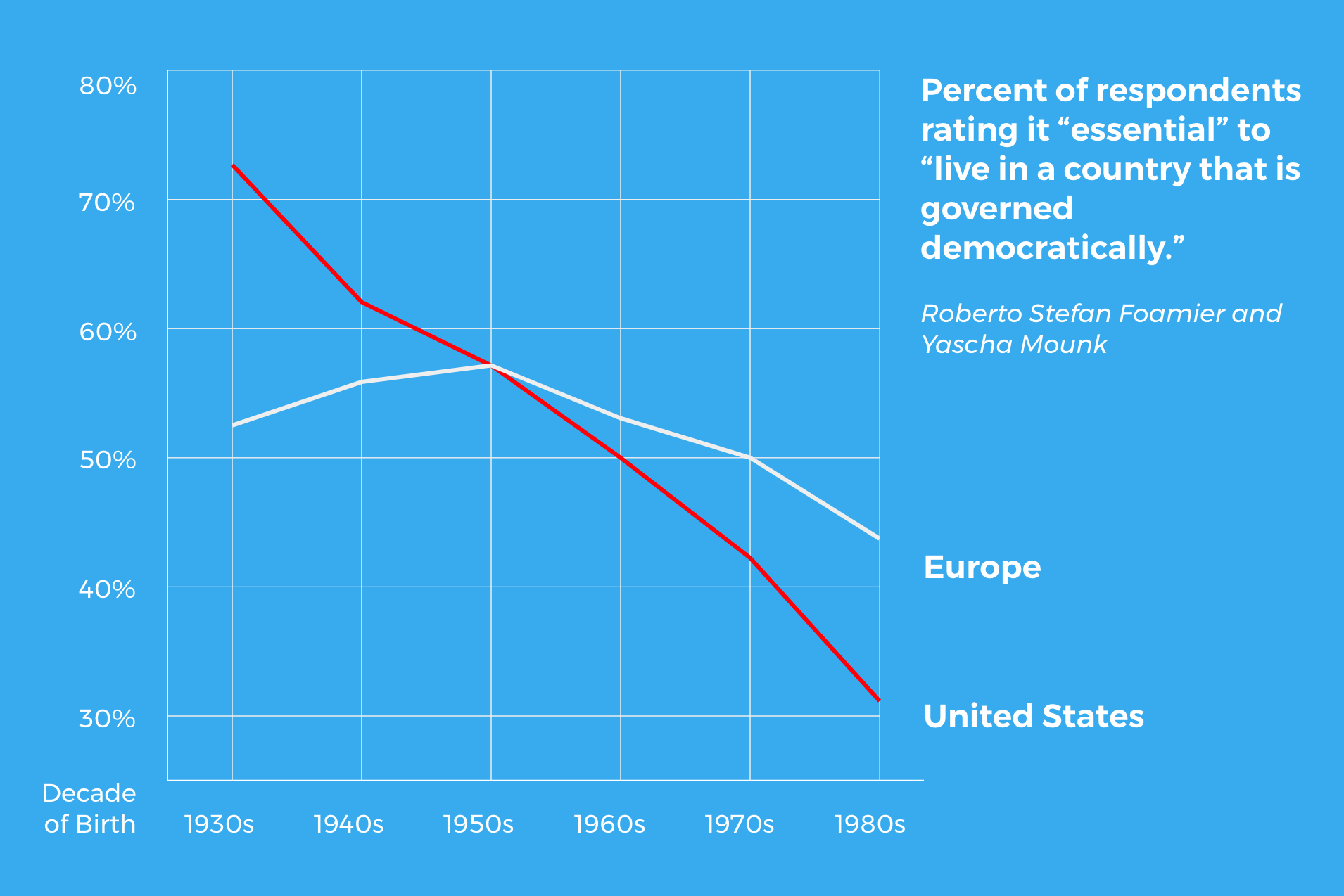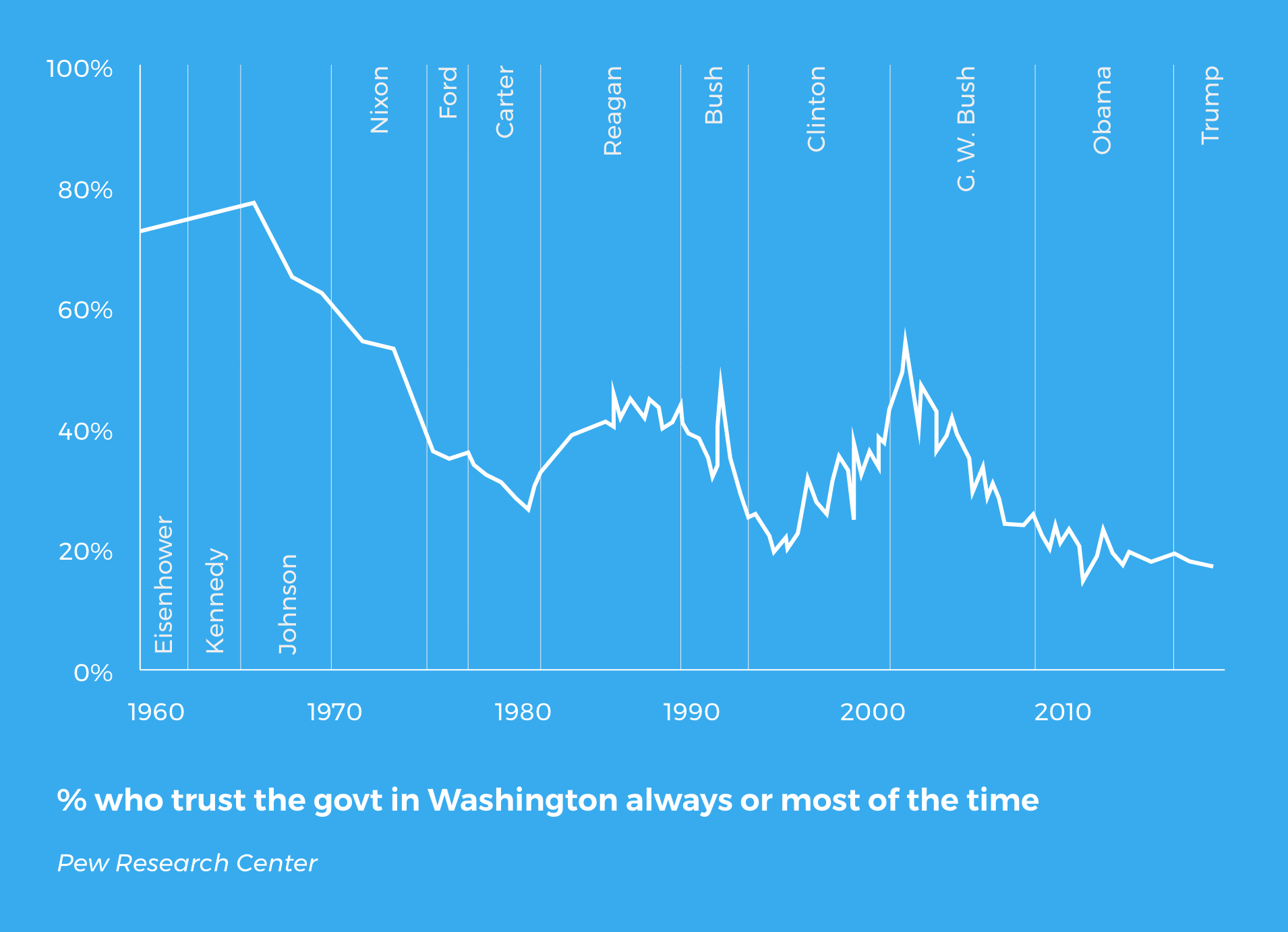In order to govern ourselves and sustain our communities, we need an adequate understanding of the law, government, and social issues; skills for discussing and working together despite our disagreements; and a widespread commitment to preserving and improving our society and the rights and interests of all our people. Since the formation of the Massachusetts Bay Colony in the early 1600s, Americans have sought to educate young people with this array of knowledge, skills, and dispositions.
Our unique American system of government relies on the civic strength to govern. We must have sufficient trust to follow our leaders and activate civic bonds for the common good. Polarization and distrust in government puts the American experiment in danger. We believe that schools must play a significant role in educating FOR constitutional democracy. The goal is to build civic strength to sustain a thriving nation.
Only 39% of Americans could name all three branches of the U.S. government, according to the Annenberg Public Policy Center; 22% couldn’t name any branch. Only about one in four students reach “proficient” scores on the National Assessment of Education Progress (NAEP) and have shown little change since the 1970s.
Americans’ distrust the government at record levels, and they also distrust their fellow citizens to participate in governance. According to The Pew Research Center, “Just 34% say they have ‘very great’ or a ‘good deal’ of trust and confidence in the political wisdom of the American people. Fully 63% have ‘not very much’ confidence or ‘no confidence at all.’”
There is growing evidence that young Americans are losing faith in western democracy and in their government. In 2011, the noted researchers Foa and Mounk found that, 24% of U.S. millennials (then in their late teens or early twenties) considered democracy to be a ‘bad’ or ‘very bad’ way of running the country.”
When distrust for major institutions combines with distrust for other citizens, the result is declining support for democracy itself. Young adults are no exception: in January 2017, 35% of Millennials said they were losing faith in American democracy, and just 25% were confident in the democratic system. In a recent survey, 43% of voters nationwide at least somewhat agree with the statement that, “the Constitution made sense in the 18th century, but it is irrelevant in the 21st century.”
Even with youth voter turnout in the 2016 election reaching 50%, youth turnout remains lower than that of any other age group. In a 2012 national survey, just 22% of 18-24 year olds who voted correctly answered two factual questions (out of two) about the candidates’ positions on the issues they cared about most, and more than 80% of middle schoolers cannot differentiate between a real news story and an advertisement.
Students who are White get more high quality civic-learning opportunities than low-income students, those who are not going to college, and students of color.
50% of Latinx 12th graders and over 60% of Black 12th graders do not even have a “basic” understanding of government. Performance on the 8th grade NAEP reflects a persistent disparity based on income. Non-subsidized lunch students scored 15 points higher than subsidized lunch students, who scored 15 points higher than free lunch students on the NAEP.
Black, Latinx, and Indigenous/Native American students scored significantly lower than White students in recent national assessments. In 2014, scores were 27 points lower for Black and 23 points lower for Latinx students.
A cause of our current levels of polarization, growing lack of faith in democracy, dearth of civic knowledge, and susceptibility to false information is the lack of meaningful, culturally relevant and engaging civic education in our schools. Since the earliest days of our constitutional republic, our schools (K-12 and Higher Education) have had a unique and essential mission to provide civic education, defined as providing the knowledge, skills and disposition to be an informed and engaged participant in American civic life. As Justice Sandra Day O’Connor said, “Knowledge of our system of government, our rights and responsibilities as citizens, is not passed down through the gene pool, it must be taught!”
This we know to be true, and research conducted by the The Center for Information and Research on Civic Learning and Engagement at Tufts University has shown, students who experience high quality civic education are:
- More likely to vote and discuss politics at home.
- More likely to complete college and develop employable skills.
- Four times more likely to volunteer and work on community issues.
- More confident in their ability to speak publicly and communicate with their elected representatives.
In the 51st annual Phi Delta Kappa poll of public attitudes on education (August 2019), Ninety-seven percent of Americans said Civics should be taught. 81% of teachers say students should be required to take a civics class. Results on civics are buttressed by another finding: Parents (78%), all adults (79%), and teachers (85%) say schools should teach values as well as factual information. 87% to 97% of all adults say public school classes on values should cover honesty, civility, respect for authority, and acceptance of people of different religions. 81% say patriotism should be included.
These findings mirror those of The Democracy Project report (June 2018) done in collaboration with the George W. Bush Institute, Penn Biden Center, and Freedom House. Their polling found the most popular initiative tested (89% support) as a way to bolster democracy was to ensure that school make civic education a bigger part of curriculum. This high level of support remained true across all age, gender, racial, political, socio economic, and geographic demographics.
What levers do we pull? To answer these questions, CivXNow partnered with the Jonathan M. Tisch College of Civic Life at Tufts to conduct a study with over 7,200 participants. The study found 75 factors contributing to the poor state of K-12 civic education, and through 12,600 survey answers mapped those factors into 14 categories – and identified three key catalysts for strengthening civic education. Systems mapping (or the 5 Whys) is an established methodology in the sciences to diagnose complex problems that is less subject to respondent bias than a survey. System mapping helps identify factors with high leverage to effect systems change. The path for ensuring youth are more prepared and engaged in civic life can be understood through the factors of the CivXNow K-12 Civic Education System Map included here.




